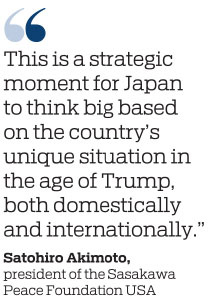Trump's Japan visit rich in symbolism
US President Donald Trump, who arrived in Tokyo on Saturday, began his state visit to Japan on Sunday morning with a round of golf with Japanese Prime Minister Shinzo Abe, followed by the Summer Grand Sumo Tournament, where Trump presented the President's Cup to the winner.
The centerpiece of the trip will be Trump's visit on Monday with new Japanese Emperor Naruhito, who has heralded the start of the country's Reiwa era.
As is traditional for state visits, the royal couple will host a formal banquet for Trump on Monday evening.
Trump is the first foreign leader to make a state visit to Japan since the May 1 enthronement of Naruhito. This is widely believed to underscore the importance of the Japan-US relationship.
Daniel Sneider, a lecturer on international policy at Stanford University, in an article in Japanese magazine Tokyo Business Today, called Trump's visit "almost completely free of serious policy discussion, but laden with policy purpose".
Showcasing relationship
The schedule for the visit is a carefully orchestrated series of message moments, Sneider wrote. "And the first and most important purpose is to showcase the personal relationship between the two men, one cultivated by Abe and the Japanese government to an extent that dwarfs similar efforts by other governments around the globe."
Abe has met and spoken by phone with Trump more than 40 times and twice has been invited to the Mar-a-Lago resort in Florida. This is Trump's second visit to Japan as US president.
Sneider said the symbolic significance of Trump's visit with Japan's new emperor cannot be underestimated, adding that the Japanese government's central goal in organizing this trip was to make sure that the US president was the first foreign leader to see the new emperor.
Sheila A. Smith, senior fellow for Japan studies at the Council on Foreign Relations, wrote in a blog that the pomp and circumstance planned for this visit by Trump to Japan shows how important the leader-to-leader approach has been to Abe.
Trump also will be taken to Japan's Maritime Self-Defense Force base in Yokosuka, Kanagawa prefecture, on Monday to board the Japanese helicopter carrier Kaga, the vessel likely to be equipped with the US-made short-takeoff and vertical landing version of the F-35 fighter, the F-35B.
Trump will be the first US president in modern history to set foot on a Japanese warship.
According to Smith, this will signify Trump's nod to Japan's growing contribution to Asia's military balance.
The Japanese government, and Abe personally, wants this visit to showcase the close security ties between the two allies.
Though analysts believe that trade will not be the focus of the visit, Trump reminded leaders from some of Japan's leading companies, including Toyota, Honda and Nissan, on Saturday evening that Japan has had "a substantial edge" for many years.
The US and Japan are negotiating a trade deal.

"With this deal we hope to address the trade imbalance, remove the barriers to United States exports and ensure fairness and reciprocity in our relationship," Trump said.
Trump has insisted that the trade deficit of $68 billion with Japan must be lowered. Even as he lifted tariffs on May 17 on steel and aluminum from Canada and Mexico, Trump maintained tariffs on Japanese metals, despite Abe's protests.
Trump decided to delay new auto tariffs for six months as his administration negotiates bilateral trade agreements with Japan and Europe.
During Trump's stay in Japan, Abe is expected to stave off further trade tensions and gain assurances that the US will maintain pressure on the Democratic People's Republic of Korea.
Important ally
Satohiro Akimoto, president of the Sasakawa Peace Foundation USA and an associate fellow at the International Institute for Strategic Studies' Asia-Pacific program, wrote in a commentary published by the Japan Times that at a time when relations between Washington and traditional US allies have frayed, Japan has established itself as the single most important ally for the US in the region - and arguably in the world.
"This is a strategic moment for Japan to think big based on the country's unique situation in the age of Trump, both domestically and internationally," Akimoto said.
When Iranian Foreign Minister Mohammad Javad Zarif visited Tokyo earlier this month, Japan made clear that it does not support the US decision to withdraw from the nuclear agreement with Iran. Japan has important oil and other economic ties with Iran.
Abe is considering a visit to Iran as early as mid-June, the first such trip in four decades, according to Japan's NHK television.
Trump will be back in Japan next month for the Group of 20 summit in Osaka on June 28 and 29.
Trump's two visits to Japan present windows of opportunity for Japan to strengthen its strategic position on the world stage, said Akimoto.
caihong@chinadaily.com.cn
(China Daily Global 05/27/2019 page1)


















